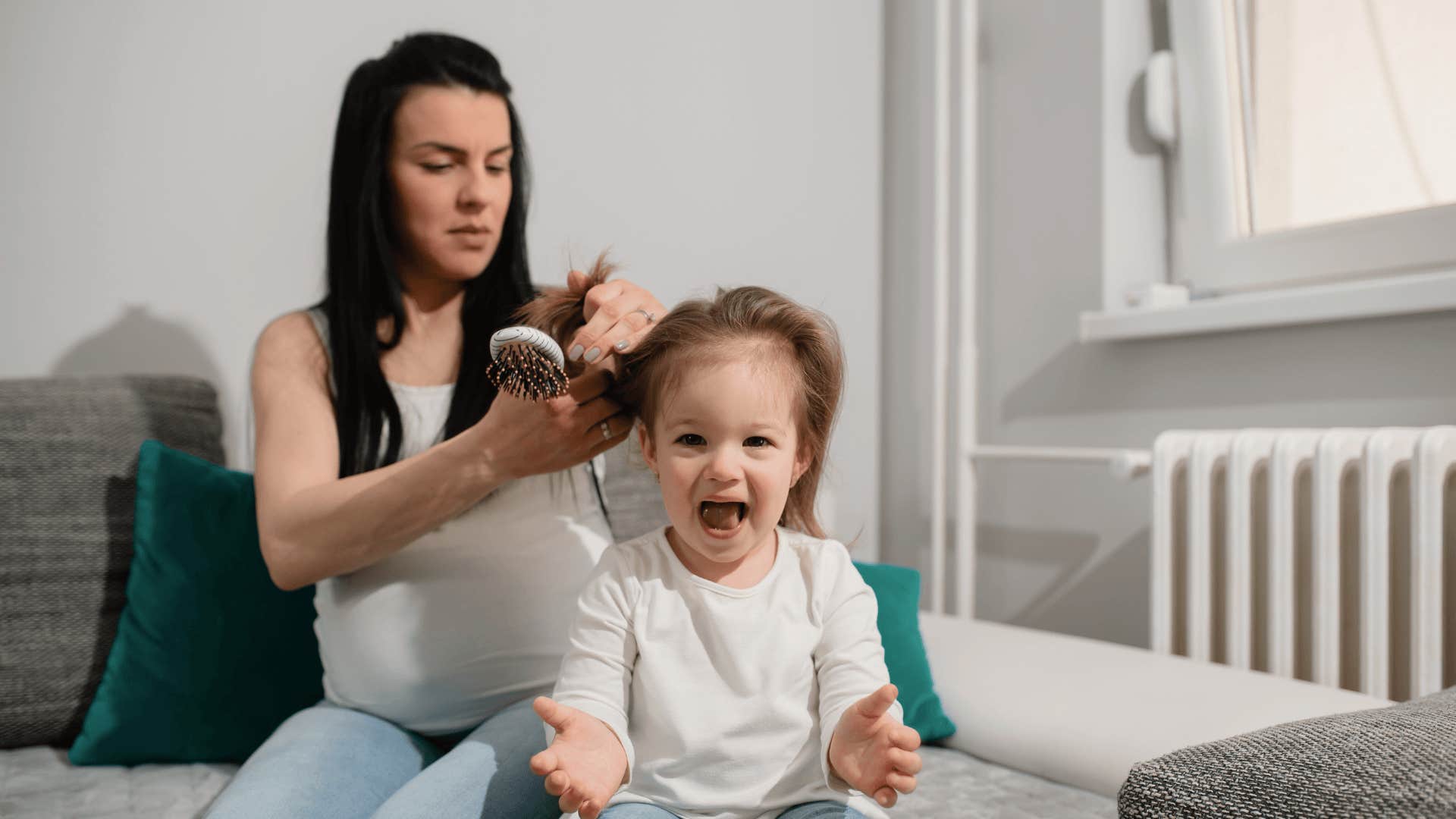10 Things Well-Meaning Parents Shrug Off That End Up Hurting Their Kids More Than They Know
How your good parenting intentions sometimes have bad consequences.
 LittleBee80 | Canva
LittleBee80 | Canva As my favorite parenting philosophy goes: "Prepare your child for the road, not the road for your child."
With this said, I've outlined 10 common mistakes well-meaning parents shrug off — me included — that end up hurting their kids. My intention isn't to point fingers but to raise awareness. What may be ingrained in our culture isn't always in the best interest of our kids.
Here are things well-meaning parents shrug off that end up hurting their kids more than they know:
1. Worshipping our children
 antoniodiaz / Shutterstock
antoniodiaz / Shutterstock
Many of us live in child-centered communities. We're raising our kids in child-centered homes. Our children love this, of course, because our lives revolve around them. And for the most part, we don't mind either, because their happiness is our happiness. It thrills us to do for them, buy for them, and shower them with love and attention.
But I think it's important to keep in mind that our children were made to be loved, not worshipped. So when we treat them like the center of the universe, we create a false idol, turning a good into an ultimate.
2. Believing our children are perfect
 Photo Book Pro / Shutterstock
Photo Book Pro / Shutterstock
One thing I often hear from professionals who work with children (counselors, teachers, etc.) is that parents today don't want to hear anything negative about their kids. When concerns are raised, even concerns voiced out of love, the knee-jerk reaction is often to attack the messenger.
The truth can hurt, but when we listen with an open heart and mind we stand to benefit. We can intervene early before a situation gets out of hand. It's easier to deal with a troubled child than repair a broken adult.
As a Children's of Alabama psychiatrist recently told me when I interviewed her on teenage depression, early intervention is key because it can change the trajectory of the child's life. She said that's why she enjoys child and adolescent psychiatry — because kids are resilient, and it's a lot easier to intervene effectively when they're young instead of years later when the problem has gone on so long it’s become incorporated into part of their identity.
Research suggests that parents believing their children are perfect can lead to negative consequences, including hindering children's emotional regulation, self-esteem, and independence. It can also potentially foster a fear of failure and a tendency to seek parental approval. Parents may have unrealistic expectations for their children, often based on their experiences or societal pressures.
3. Living vicariously through our children
 StrDr stock / Shutterstock
StrDr stock / Shutterstock
We, parents, take great pride in our children. When they succeed, it makes us happier than if we'd done it ourselves. But if we're overly involved and invested in their lives, it gets hard to see where they end and we begin.
When our children become extensions of us, we may see them as our second chance. Suddenly it's not about them, it's about us. This is where their happiness starts getting confused with our happiness.
4. Wanting to be our child's BFF
 fast-stock / Shutterstock
fast-stock / Shutterstock
When I asked a priest to name the biggest mistake he sees in parenting, he thought for a moment and then said, "Parents not being parents. Not stepping up to the plate to do hard things."
Like everyone, I want my children to love me. I want them to sing my praises and appreciate me. But if I'm doing my job right, they'll get mad and not like me sometimes. They'll roll their eyes, moan, and groan, and wish they'd been born into another family.
Seeking to be our child's BFF can only lead to permissiveness and choices made out of desperation because we fear losing their approval. That's not love on our end; that's need.
Parents striving to be their child's best friend can undermine their authority, hinder healthy development, and lead to over-indulgence and difficulty setting boundaries. A 2022 study found that children who grow up in a parent-friend dynamic may struggle to form healthy relationships later in life, as they may have trouble navigating hierarchical relationships and understanding the roles of authority and guidance.
5. Engaging in competitive parenting
 Antonio Guillem / Shutterstock
Antonio Guillem / Shutterstock
Every parent has a competitive streak. All it takes to stir this monster in us is another parent giving his or her child a leg up at our child's expense.
I hear these stories a lot at the junior high and high school levels, stories of broken friendships and betrayals due to one family blindsiding another family. In my opinion, the root is fear. We fear our children will get left behind. We fear that if we don't jump into the craziness, and pull out every stop to help them excel early, they'll be stuck in mediocrity the rest of their life.
I believe children need to work hard and understand that dreams don't come on a silver platter; they have to sweat and fight for them. But when we instill a "win at all costs" attitude, permitting them to throw anyone under the bus to get ahead, we lose sight of character. The character may not seem important in adolescence, but in adulthood it's everything.
6. Missing the wonder of childhood
 fizkes / Shutterstock
fizkes / Shutterstock
The other day I found a Strawberry Shortcake sticker on my kitchen sink. It reminded me how blessed I am to share my home with little people. One day there won't be stickers on my sink.
There won't be Barbies in my bathtub, baby dolls on my bed, or Mary Poppins in the DVD player. My windows will be clear of sticky handprints, and my home will be quiet because my daughters will be hanging out with friends instead of nesting at home with me.
Raising small children can be hard, monotonous work. At times it's so physically and emotionally exhausting we wish they were older to make our life easier.
We're also kind of curious about who they'll grow up to be. What will be their passion? Will their God-given gifts be clear? As parents we hope so, for knowing which strengths to nurture enables us to point them in the right direction.
But as we project into the future, wondering if our child's knack for art will make them a Picasso, or if their melodic voice will create a Taylor Swift, we may forget to soak up the splendor in front of us: toddlers in footed pajamas, bedtime stories, tummy tickles, and elated squeals. We may forget to let our children be little and enjoy the one childhood they're given.
The pressures on kids start way too early. If we really want our kids to have a leg up, we need to protect them from these pressures. We need to let them have fun and grow at their own pace so 1) they can explore their interests without fear of failure and 2) they don't get burned out. Childhood is a time for free play and discovery. When we rush children through it, we rob them of an innocent age they'll never pass through again.
While fostering a child's sense of wonder and allowing them to enjoy childhood is essential, parents must also prepare them for the realities of the world and equip them with the skills to navigate challenges, potentially leading to a well-rounded development. A 2023 study cautioned that overprotecting children and shielding them from obstacles can hinder their problem-solving skills and resilience development.
7. Raising the children we want, not the children we have
 Ekateryna Zubal / Shutterstock
Ekateryna Zubal / Shutterstock
As parents, we harbor dreams for our children. They start when we get pregnant, before the gender's even known. Secretly we hope they'll be like us, only smarter and more talented. We want to be their mentors, putting our life experiences to good use.
But the irony of parenting is that children turn our molds upside down. They come out wired in ways we never anticipated. Our job is to figure out their inherent, God-ordained bent and train them in that direction. Forcing our dreams on them won't work. Only when we see them for who they are can we impact their life powerfully.
8. Forgetting our actions speak louder than words
 Pixel-Shot / Shutterstock
Pixel-Shot / Shutterstock
Sometimes when my kids ask a question, they'll say, "Please answer in one sentence." They know me well, for I'm always trying to squeeze life lessons into teachable moments. I want to fill them with wisdom, but what I forget is how my example overshadows my words.
How I handle rejection and adversity… how I treat friends and strangers… whether I nag or build up their father… they notice these things. And the way I respond gives them permission to act the same.
If I want my children to be wonderful, I need to aim for wonderful, too. I need to be the person I hope they'll be.
When parents forget that actions speak louder than words, children may struggle to develop strong moral compasses and internalize the values they are taught, potentially leading to behavioral issues and weakened self-regulation. A 2015 study explained that while actions are crucial, words significantly shape a child's self-esteem, confidence, and overall sense of worth.
9. Judging other parents and their kids
 Nicoleta Ionescu / Shutterstock
Nicoleta Ionescu / Shutterstock
No matter how much we disagree with someone's parenting style, it's not our place to judge. Nobody in this world is "all good" or "all bad"; we're all a mix of both, a community of sinners struggling with different demons.
I tend to cut other parents more slack when I'm going through hard spells. When my child is testing me, I'm compassionate to parents in the same boat. When my life is overwhelming, I'm forgiving of others who slip up and let things fall through the cracks. We never know what someone's going through or when we'll need mercy ourselves.
And while we can't control judgmental thoughts, we can cut them short by seeking to understand the person instead of jumping to conclusions.
10. Underestimating character
 pikselstock / shutterstock
pikselstock / shutterstock
If there's one thing I hope to get right in my children, it's their CORE. Character, moral fiber, an inner compass… these things lay the foundation for a happy, healthy future. They matter more than any report card or trophy ever will.
None of us can force character on our kids, and at age 10 or 15 characters won't mean much. Children care about short-term gratification, but we, as parents, know better.
We know that what will matter at 25, 30, and 40 is not how far they once threw the football, or whether they made cheerleaders, but how they treat others and what they think of themselves.
If we want them to build character, confidence, strength, and resilience, we need to let them face adversity and experience the pride that follows when they come out stronger on the other side. It's hard to see our children fall, but sometimes we have to. Sometimes we have to ask ourselves whether intervening is in their best interest.
There are a million ways to love a child, but in our quest to make them happy, let us stay mindful that sometimes it takes short-term pain to earn a long-term gain.
Parents can cultivate their children's character by modeling positive behaviors, fostering a safe and supportive environment, encouraging responsibility and independence, and actively teaching and discussing values and ethics. A 2022 study recommended discussing essential values like honesty, kindness, respect, and empathy with your children.
Kari Kubiszyn Kampakis is a blogger and newspaper columnist. She has been featured on HuffPost Parents, The Good Men Project, and more.

